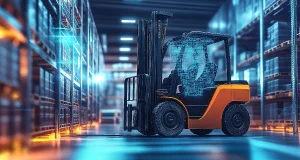Guest Speaker:
Transcripts
Welcome to Tech Lyceum. My name is Neerja, and in this episode, we dive into the future of energy with a closer look at everything from Smarter wells to predictive pipelines. We're going to talk about the ways in which AI and ML are transforming oil and gas. Yeah, are we ready for this?
Joining us are two experts that we're thrilled to get into this conversation with. We have Rishi Verma, senior practice Director AI. Rishi is someone who has been at the forefront of AI long before it became a buzzword.With over two decades of experience, Rishi brings a unique blend of deep, technical, know how and business first thinking. He's led AI and Gen AI implementations across industries like manufacturing, BFSI, energy and life sciences, always with a sharp eye on delivering real business value. Rishi, it is great to have you on Tech Lyceum, how are you doing today?
Joining us are two experts that we're thrilled to get into this conversation with. We have Rishi Verma, senior practice Director AI. Rishi is someone who has been at the forefront of AI long before it became a buzzword.With over two decades of experience, Rishi brings a unique blend of deep, technical, know how and business first thinking. He's led AI and Gen AI implementations across industries like manufacturing, BFSI, energy and life sciences, always with a sharp eye on delivering real business value. Rishi, it is great to have you on Tech Lyceum, how are you doing today?
Listen On

Speaker – Rishi – 01:09
Yeah. Hi, Neerja, thanks for having me. I'm doing well.
Yeah. Hi, Neerja, thanks for having me. I'm doing well.
Speaker – Neerja – 01:12
Great. Let's also say hello to Elvin Dias, AVP, strategic accounts at Birlasoft, based in Houston and deeply embedded in the industrial and oil and gas space. Elvin partners with clients to navigate the fast-changing tech landscape. He brings a frontline view of how emerging technologies are reshaping business strategy. Elvin, welcome to the show. How are you doing today?
Great. Let's also say hello to Elvin Dias, AVP, strategic accounts at Birlasoft, based in Houston and deeply embedded in the industrial and oil and gas space. Elvin partners with clients to navigate the fast-changing tech landscape. He brings a frontline view of how emerging technologies are reshaping business strategy. Elvin, welcome to the show. How are you doing today?
Speaker – Elvin – 01: 38
I'm good. Neerja, thanks for having me.
I'm good. Neerja, thanks for having me.
Speaker – Neerja – 01:41
Of course, we are excited to get both your perspectives, and I'll start with you. Rishi,
Q: In what specific ways are AI and ML transforming exploration and drilling operations, and how are these technologies helping to reduce operational risks while improving cost efficiency also?
Of course, we are excited to get both your perspectives, and I'll start with you. Rishi,
Q: In what specific ways are AI and ML transforming exploration and drilling operations, and how are these technologies helping to reduce operational risks while improving cost efficiency also?
Speaker – Rishi – 02:01
Yeah, sure, Neerja, you know, let's talk about how AI and machine learning are revolutionizing the exploration and drilling in the oil and gas industry.
First off, these technologies are transforming how we find and assess reserves. AI algorithms analyze seismic data and geological patterns to pinpoint potential drilling sites with incredible precision, cutting down the guesswork and reducing drywall risk. On drilling side, real time machine learning algorithms, they optimize the parameters like weight-on-bit and torque by analyzing the sensor data streams, preventing blowouts and equipment failures. So imagine we have a super smart assistant that can predict where oil might be hiding underground. It's a game changer, right ?
In drilling operations, machine learning models, they optimize drilling parameters in real time. They are just for things like pressure, bit wear, and it helps us prevent the costly equipment failure and the blowouts. So this minimizes the operational risk, but also slashes the downtime term. Technologically, we are building AI agents like an autonomous digital assistants that monitor 1000s of drilling metrics and make near real time adjustments without any human input, these agents can help reduce non productive time by 25% and the result the operational risk, drop, safety improves, costs are slashed, and because we are drilling smarter, not just harder, with the technology that learns and adapts on the fly. That is how AI and ML is significantly impacting the oil and gas industry.
Yeah, sure, Neerja, you know, let's talk about how AI and machine learning are revolutionizing the exploration and drilling in the oil and gas industry.
First off, these technologies are transforming how we find and assess reserves. AI algorithms analyze seismic data and geological patterns to pinpoint potential drilling sites with incredible precision, cutting down the guesswork and reducing drywall risk. On drilling side, real time machine learning algorithms, they optimize the parameters like weight-on-bit and torque by analyzing the sensor data streams, preventing blowouts and equipment failures. So imagine we have a super smart assistant that can predict where oil might be hiding underground. It's a game changer, right ?
In drilling operations, machine learning models, they optimize drilling parameters in real time. They are just for things like pressure, bit wear, and it helps us prevent the costly equipment failure and the blowouts. So this minimizes the operational risk, but also slashes the downtime term. Technologically, we are building AI agents like an autonomous digital assistants that monitor 1000s of drilling metrics and make near real time adjustments without any human input, these agents can help reduce non productive time by 25% and the result the operational risk, drop, safety improves, costs are slashed, and because we are drilling smarter, not just harder, with the technology that learns and adapts on the fly. That is how AI and ML is significantly impacting the oil and gas industry.
Speaker – Neerja – 03:48
Got it. Rishi, thank you for those insights. Elvin, let me ask you this question,
Q: How is machine learning reshaping predictive maintenance strategies in the oil and gas sector, and what key advantages does it offer compared to traditional time based or reactive maintenance approaches?
Got it. Rishi, thank you for those insights. Elvin, let me ask you this question,
Q: How is machine learning reshaping predictive maintenance strategies in the oil and gas sector, and what key advantages does it offer compared to traditional time based or reactive maintenance approaches?
Speaker – Elvin – 04:07
Sure, Neerja. So let's dive into how machine learning is transforming predictive maintenance in the oil and gas and manufacturing space. So traditionally, maintenance was either time based, scheduled at fixed intervals, regardless of actual equipment, condition or reactive only performed after a failure occurred. Both approaches can lead to inefficiencies, unnecessary costs and unexpected downtime. Machine learning enables a shift to predictive maintenance. Sensors embedded in industrial equipment's like pumps, compressors and drilling systems collect real time data on temperature, vibration, pressure and more. ML models analyze this data to detect patterns and predict when a component is likely to fail it is like having a digital early warning system maintenance can now be scheduled just before a failure is like.
Quickly reducing downtime and extend extending equipment life. In some cases, companies have seen up to 30% savings in maintenance costs. The biggest advantage over traditional models is the ability to prevent unplanned shutdowns, which can be extremely costly in oil and gas operations. Predictive Maintenance also enhances safety by identifying risk before they escalate. It is a smarter, more proactive way to keep operations running smoothly and reliably.
Sure, Neerja. So let's dive into how machine learning is transforming predictive maintenance in the oil and gas and manufacturing space. So traditionally, maintenance was either time based, scheduled at fixed intervals, regardless of actual equipment, condition or reactive only performed after a failure occurred. Both approaches can lead to inefficiencies, unnecessary costs and unexpected downtime. Machine learning enables a shift to predictive maintenance. Sensors embedded in industrial equipment's like pumps, compressors and drilling systems collect real time data on temperature, vibration, pressure and more. ML models analyze this data to detect patterns and predict when a component is likely to fail it is like having a digital early warning system maintenance can now be scheduled just before a failure is like.
Quickly reducing downtime and extend extending equipment life. In some cases, companies have seen up to 30% savings in maintenance costs. The biggest advantage over traditional models is the ability to prevent unplanned shutdowns, which can be extremely costly in oil and gas operations. Predictive Maintenance also enhances safety by identifying risk before they escalate. It is a smarter, more proactive way to keep operations running smoothly and reliably.
Speaker – Neerja – 05:31
Yeah, some very good points there, and I think we at this point should also talk about some of the hurdles that come with this. Rishi,
Q: What are the key barriers to scaling AI and ML solutions across oil and gas enterprises, and how can organizations address challenges around you know, say, data infrastructure, talent shortages and change management to drive successful adoption?
Yeah, some very good points there, and I think we at this point should also talk about some of the hurdles that come with this. Rishi,
Q: What are the key barriers to scaling AI and ML solutions across oil and gas enterprises, and how can organizations address challenges around you know, say, data infrastructure, talent shortages and change management to drive successful adoption?
Speaker – Rishi – 05:57
Sure. Neerja, let's unpack the hurdles to scaling AI and machine learning in oil and gas and how we typically tackle them. Okay, the one major barrier is data infrastructure. Now, many companies have siloed inconsistent data from decades of operation, and it makes AI system tough to work effectively. So we need to start with data, we need to invest in unified platforms to clean and integrate data sets ensuring AI has quality fuel to run on, and there is a talent gap right finding the experts who understand both AI and the nuances of oil and gas is not easy for talent upskilling with auto machine learning tools help bridge the gaps. AI agents are being built as virtual coaches in implementations, guiding staff through new systems in real time, capturing expert know how, and easing adoption. And let's talk about the change management a bit. Now, employees often resist new technology due to fear of job loss or just unfamiliarity. So how do we overcome there on this leadership needs to communicate clearly, show how AI augments, not replaces human roles, and involve teams early in pilot projects to build that trust. So it's a journey. It's not a sprint, but with a roadmap that prioritizes the data, readiness, skill building, people, engagement, companies can definitely scale AI successfully and drive real transformation across their operations.
Sure. Neerja, let's unpack the hurdles to scaling AI and machine learning in oil and gas and how we typically tackle them. Okay, the one major barrier is data infrastructure. Now, many companies have siloed inconsistent data from decades of operation, and it makes AI system tough to work effectively. So we need to start with data, we need to invest in unified platforms to clean and integrate data sets ensuring AI has quality fuel to run on, and there is a talent gap right finding the experts who understand both AI and the nuances of oil and gas is not easy for talent upskilling with auto machine learning tools help bridge the gaps. AI agents are being built as virtual coaches in implementations, guiding staff through new systems in real time, capturing expert know how, and easing adoption. And let's talk about the change management a bit. Now, employees often resist new technology due to fear of job loss or just unfamiliarity. So how do we overcome there on this leadership needs to communicate clearly, show how AI augments, not replaces human roles, and involve teams early in pilot projects to build that trust. So it's a journey. It's not a sprint, but with a roadmap that prioritizes the data, readiness, skill building, people, engagement, companies can definitely scale AI successfully and drive real transformation across their operations.
Speaker – Neerja – 07:39
Thank you, Rishi, it's like you said, it's a journey and not a sprint. I love that. Slow and steady wins the race. And I have one final question for you, Elvin,
Q: How are AI and ML being leveraged to streamline supply chain and logistics in the oil and gas industry, and what tangible improvements have companies seen in terms of responsiveness, cost savings and risk reduction,
Thank you, Rishi, it's like you said, it's a journey and not a sprint. I love that. Slow and steady wins the race. And I have one final question for you, Elvin,
Q: How are AI and ML being leveraged to streamline supply chain and logistics in the oil and gas industry, and what tangible improvements have companies seen in terms of responsiveness, cost savings and risk reduction,
Speaker – Elvin – 08:05
Absolutely. Let's explore how AI and machine learning are streamlining supply chain and logistics in the oil and gas sector. This industry operates across vast and complex networks, coordinating raw materials, manufacturing components and delivering equipment to remote sites. AI helps optimize these processes by forecasting demand, managing inventory and improving delivery logistics. For example, ML models can predict material requirements based on billing schedules, historical usage and external factors like market trends. AI also analyzes real time data such as weather traffic and geopolitical events to suggest optimal shipping routes and schedules. Digital twins of supply network simulate 1000s of scenarios using reinforcement learning helping optimize inventory placement and logistic flows. AI agents can autonomously adjust delivery plans or reroute shipments when disruptions occur. The impact is significant. Companies have reported 15 to 20% reductions in logistic costs, improved responsiveness to changing conditions and better risk mitigation, predictive analytics can flag potential delays or shortages before they affect operations. It's about building a supply chain that's not just faster, but smarter and more resilient.
Absolutely. Let's explore how AI and machine learning are streamlining supply chain and logistics in the oil and gas sector. This industry operates across vast and complex networks, coordinating raw materials, manufacturing components and delivering equipment to remote sites. AI helps optimize these processes by forecasting demand, managing inventory and improving delivery logistics. For example, ML models can predict material requirements based on billing schedules, historical usage and external factors like market trends. AI also analyzes real time data such as weather traffic and geopolitical events to suggest optimal shipping routes and schedules. Digital twins of supply network simulate 1000s of scenarios using reinforcement learning helping optimize inventory placement and logistic flows. AI agents can autonomously adjust delivery plans or reroute shipments when disruptions occur. The impact is significant. Companies have reported 15 to 20% reductions in logistic costs, improved responsiveness to changing conditions and better risk mitigation, predictive analytics can flag potential delays or shortages before they affect operations. It's about building a supply chain that's not just faster, but smarter and more resilient.
Speaker – Neerja - 09:35
Thank you, Elvin, for covering all of that. AI is clearly changing the game, and it was great to have you, Elvin and you Rishi, for your thoughts on the subject today. Thank you so much for joining us.
Thank you, Elvin, for covering all of that. AI is clearly changing the game, and it was great to have you, Elvin and you Rishi, for your thoughts on the subject today. Thank you so much for joining us.
Speaker – Elvin- 09:47
Thank you.
Thank you.
Speaker – Rishi – 09:48
Thank you.
Thank you.
Speaker – Neerja – 09:49
And that's a wrap for today's episode. Now we've covered a lot of ground, from how AI and ML are making exploration and drilling smarter and safer to how they are helping predict failures before they happen and bring real efficiencies to supply chain and logistics.
Big thanks once again, to Rishi and Elvin for breaking it all down so clearly for us and for sharing what it really takes to scale these technologies beyond just the tech right? We hope you found this podcast as insightful as we did. Thank you for tuning in to Tech Lyceum, and we'll catch you in the next one.
And that's a wrap for today's episode. Now we've covered a lot of ground, from how AI and ML are making exploration and drilling smarter and safer to how they are helping predict failures before they happen and bring real efficiencies to supply chain and logistics.
Big thanks once again, to Rishi and Elvin for breaking it all down so clearly for us and for sharing what it really takes to scale these technologies beyond just the tech right? We hope you found this podcast as insightful as we did. Thank you for tuning in to Tech Lyceum, and we'll catch you in the next one.
You were listening to Tech Lyceum, a podcast from Birlasoft.
Other related Tech Lyceum episodes





